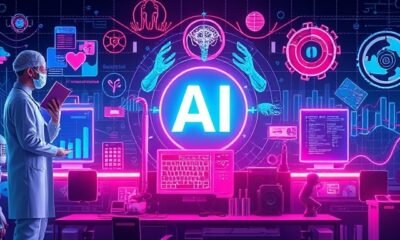Artificial Intelligence
Healthcare Data Analysis Using AI: Transforming Patient Outcomes
Modern healthcare data analysis with artificial intelligence tools improves patient care through enhanced decision systems and individualized treatment approaches which enhance medical results. Read more…

Healthcare professionals now use AI technology to process large healthcare datasets with speed and efficiency thus transforming medical approaches to patient care. AI technology detects previously undetectable insights within different types of healthcare data including patient records and clinical trials and genomic data points thus enabling faster and more precise diagnoses.
Definition:
Role of AI in Healthcare Data Analysis:
AI system capabilities surpass traditional analytical methods when processing huge volumes of information. Through the combination of machine learning and natural language processing AI processes information from patient records together with clinical trials and imaging data and insurance claims. The process allows users to locate important patterns efficiently and effectively.
Can AI identify trends and anomalies in patient data?
Pattern recognition functions of AI align perfectly with healthcare applications. The system detects medical irregularities while tracking disease evolution patterns alongside finding relationships that routine medical staff might overlook. The application of this approach results in both increased diagnostic speed and enhanced diagnostic accuracy.
How does AI uncover valuable medical insights?
Through its ability to analyze multiple data layers AI enables healthcare professionals to discover hidden connections between data types such as imaging results and genetic information. AI technology has proven vital to detecting early warning signs of life-threatening diseases including cancer and heart failure.
How does AI enable real-time monitoring for critical patients?
The continuous analysis of medical device information including heart rate monitors and oxygen sensors as well as wearable devices through AI-powered monitoring systems improves patient care. Real-time detection of abnormal patterns including warning signs through these systems enables healthcare professionals to perform prompt medical intervention. The early intervention resulting from proactive care strategies decreases medical complications and improves critical patient outcomes.
How does Natural Language Processing (NLP) help analyze medical records and clinical notes?
The analysis and processing of unstructured medical information including doctors’ notes and clinical records and patient histories become possible with NLP technology. AI systems establish meaning from such information through organization to recognize patterns along with warning about risks and maintain precise documentation. The analysis allows medical practitioners to make better choices while coding becomes more efficient and researchers discover previously hidden patient information.
How is AI used for mental health analysis and behavioral predictions?
AI platforms combine sentiment analysis software and predictive algorithms to track behavior patterns by analyzing speech and text data which mobile applications and therapy sessions often collect. These analytical tools detect the hidden psychological markers that signal depression alongside anxiety and behavioral disorders. Through AI insights medical professionals and therapists create personalized treatment plans which produce better mental health results while also allowing for early intervention.
Can AI automate administrative tasks in healthcare?
AI reduces healthcare administrative tasks through its ability to handle repetitive workload including scheduling appointments and billing along with medical coding activities and claims processing. Healthcare patients achieve fast information access through virtual assistants and digital chatbots. AI enables healthcare practitioners to spend more time caring for patients because it alleviates the excessive administrative burdens healthcare staff faces.
How does AI contribute to drug repurposing and discovery?
Processed by AI technology massive datasets lead to faster discovery of potential therapeutic candidates. The predictive capabilities of machine learning models determine which compounds will engage with biological systems thus eliminating extensive trial-and-error testing. AI technology helps scientists discover new therapeutic applications for available drugs which both speeds up medical responses to urgent needs and reduces development expenses.
How can AI analyze genomic data for personalized treatments?
The analysis speed and data interpretation capabilities of AI systems reveal disease or condition-related patterns embedded within genomic data. The evaluation of individual genetic information against massive libraries through AI systems generates customized therapeutic recommendations and forecasts treatment responses while detecting inherited disease elements. The approach pushes precision medicine toward practical application while delivering individualized medical solutions that enhance patient results and medical interventions.
Key Applications of AI in Healthcare Data Analysis:
Through data analysis that combines historical healthcare records with regional weather patterns and population density information AI models generate predictions about disease outbreaks across different areas. The analytical approach helps healthcare providers estimate risk levels for complications so they can start treatment early.
Medical Imaging and Diagnostics:
AI-based platform technology analyzes X-rays or CT scans to detect medical irregularities which it then presents to radiologists for potential fracture or cancer assessment. Google DeepMind tools demonstrate an accuracy rate of over 90% when detecting eye disorders.
How does AI optimize Electronic Health Records (EHR):
The analysis of Electronic Health Records by AI technology detects treatment disparities while safeguarding patients from drug side effects and optimizes practice protocols. The system makes healthcare data easier to manage which frees up time for physicians to dedicate to their patients.
Personalized Medicine Using AI:
Academic tools leveraging genetic information produce customized therapeutic approaches which enhance treatment success rates while minimizing side effects. Instructional precision medicine delivers personalized medical treatments that suit individual needs better than standard treatment protocols.
Role of AI in Drug Discovery:
Drug development requires finding the hidden needle within an enormous haystack. The combination of AI technology allows critical inspections of extensive clinical trial data and chemical compounds thus reducing drug discovery timelines from multiple years to several months.
AI-Powered Virtual Health Assistants:
Virtual health assistants which are powered by AI technology give patients continuous accessible support throughout all hours of the day. Health assistants powered by artificial intelligence deliver healthcare assistance through question responses and prescription management and appointment scheduling which results in better patient education and simplified healthcare access. With natural language processing technology these systems create individualized interactions which make patients feel like their concerns receive direct attention.
AI in Remote Patient Monitoring:
Remote patient monitoring through artificial intelligence enables healthcare providers to monitor patient health data including vital signs along with symptoms simultaneously. Medical alert systems through wearable devices use sophisticated AI detection along with specialist notifications to limit patients’ requirement of continuous doctor appointments. The technology enables improved care for chronic disease patients to help them better control their illnesses and maintain better health outcomes.
AI for Early Disease Detection:
Using medical images and genetic information alongside patient histories AI detection systems demonstrate exceptional capabilities for detecting diseases in their initial stages. Machine learning algorithms identify patterns which human clinicians might miss leading to prompt interventions for cancer along with diabetes and cardiovascular diseases. Through early diagnosis the prognosis improves with reduced expenses associated with treatment.
AI in Surgical Assistance and Robotics:
The precision of surgical procedures underwent unprecedented enhancement through AI-driven robotic systems. AI-driven robotic surgery systems combine with minimal invasive techniques to achieve both fast recovery times and reduced risks and improved precision. AI technology delivers operational real-time data to surgeons which helps them make better decisions throughout procedures thus improving treatment results.
AI-Driven Medical Chatbots for Patient Support:
Medical AI-based chatbots are revolutionizing patient support through their ability to provide instant clinical advice and consultative assistance. The system combines sophisticated algorithms which perform symptom evaluation to generate preliminary guidance while directing patients toward suitable medical support services. Patients have easy access to round-the-clock support because these systems operate continuously.
AI for Automating Clinical Trials and Research:
Through automation AI optimizes clinical trials by performing participant recruitment tasks and data acquisition operations and analytical operations. The identification of suitable candidates combined with trial outcome prediction functions of AI results in faster research through reduced inefficiencies. Despite regulatory requirements AI enables clinicians to expedite innovative treatment distribution to patients via improved compliant delivery.
AI in Public Health Surveillance and Disease Prevention:
Through analysis of large health records and environmental data and social determinants AI strengthens current public health surveillance capabilities. Real-time analysis through this system enables scientists to identify disease outbreaks and understand their evolution as they create prevention programs. AI prediction tools serve as essential instruments for disease containment along with their valuable contribution to public health success.
AI-Powered Rehabilitation and Physical Therapy:
Through motion sensors combined with machine learning algorithms AI creates individualized rehabilitation and physical therapy frameworks. These digital systems track patient physical activity to generate feedback which guides tailored exercise adaptations according to each individual’s progress. The customized treatment approach generates better outcomes while supporting conventional medical practices throughout various medical conditions.
AI for Optimizing Hospital Resource Management:
AI monitors the operational needs of the hospital system while analyzing bed occupancy rates and staffing needs and equipment availability to guarantee optimal resource distribution. The implementation of this system leads to shorter wait times and improved facility space management which results in better healthcare facility operational performance.
Benefits of AI in Healthcare Data Analysis:
Better Decision-Making: AI technology provides me precise data-based recommendations both during medical diagnosis and after treatment evaluation. This enhances decision reliability.
Higher Efficiency: By speeding up data analysis and record management alongside disease detection AI enhances operational system efficiency.
Cost Reduction: The automation of data-analysis generates substantial operational cost reductions for medical facilities. The saved money allows healthcare organizations to invest better resources into developing their care systems.
Patient Benefits: When AI generates tailored insights the outcomes of treatments improve along with patient satisfaction and life quality.
Enhanced Predictive Capabilities: AI-powered algorithms demonstrate unmatched ability to forecast future health conditions by processing large patient data sets. Through proactive actions healthcare providers can detect health issues before they advance which produces superior patient results while minimizing serious medical complications.
Improved Diagnostic Accuracy: Through the combination of medical imaging with genetic data and patient histories AI systems enable healthcare professionals to achieve exact diagnoses. The diagnostic tools cut down on professional mistakes which enables medical teams to correctly detect and manage issues without delay.
Real-Time Monitoring: The combination of AI systems with wearable technology and IoT equipment enables sustained patient surveillance. Data collection occurs in real time so doctors obtain quick actionable information that helps them respond immediately to patient condition changes.
Better Resource Management: Through AI healthcare organizations achieve maximum resource management for both personnel scheduling and inventory tracking. The predictive power of AI brings both patient volume forecasts and resource constraints identification to healthcare facilities which results in optimized facility operations.
Enhanced Drug Development: Through AI technology the search for new medications gains speed as it finds promising compounds alongside drug response projections while minimizing drug development duration. The combination of accelerated treatment development with decreased research expenses results in faster medical solution creation.
Streamlined Clinical Trials: Through AI technology clinical trials gain improved efficiency from candidate selection to data analysis and patient monitoring capabilities. The implementation of this system produces more successful trials at a faster pace which decreases the time required to launch new treatments to market.
AI-Driven Personalized Medicine: AI uses genetic profiles together with health histories and lifestyle factors to create treatment plans which match individual requirements. Through specific care planning personalized medicine provides enhanced patient successes and reduces the potential risks which adverse effects may cause.
Challenges and Limitations of AI in Healthcare Data Analysis:
Healthcare organizations that implement AI systems must access extensive patient information which poses major challenges to individual privacy protection. Data security together with HIPAA compliance regulations represent vital factors because any security breach threatens to damage sensitive medical records and undermine patient trust.
AI System Bias:
AI systems draw their biases from the datasets which trained them despite recent technological developments. Healthcare models that fail to receive proper testing or model development may reproduce current healthcare inequalities by targeting minority populations and underserved groups.
Integration with Outdated Systems:
Organizational systems developed in the past create major obstacles which prevent straightforward AI integration. AI applications that lack comprehensive platform updates together with middleware solutions create bottlenecks that restrict both workflow efficiency and recommendation accuracy.
Ethical Considerations in AI:
Scientists actively work to determine clear moral limits for artificial intelligence usage in decision-making processes. There remain many uncertainties about the proper limits AI should set on medical decisions while both healthcare providers and patients require dependable answers when AI produces mistakes or negative outcomes.
High Costs of AI Implementation:
Healthcare organizations must invest substantial money in AI deployment through expenditures for system maintenance as well as software purchases and training programs and hardware infrastructure. Business costs frequently prevent smaller hospitals and underdeveloped areas from implementing new healthcare technology.
Limited Transparency in AI Decisions:
Deep learning-powered models function like “black boxes” which creates difficulties for medical practitioners to understand the reasoning behind particular diagnostic outcomes. Healthcare adoption faces difficulties due to inadequate transparency in key medical settings.
Dependence on Quality Data:
The effective operation of AI systems depends heavily on obtaining superior quality data that accurately represents the information needed for their operation. When data collection has gaps or when inaccuracies or underrepresentation occurs within specific subsets it diminishes the reliability and useful value of AI-driven insights.
Future of AI in Healthcare Data Analysis:
Enhanced AI Accuracy: Future artificial intelligence systems will achieve better diagnostic precision through layered machine learning integration.
Real-Time IoT Monitoring: AI-powered IoT devices enable real-time patient monitoring through which devices immediately detect abnormal conditions.
Telemedicine Expansion: Through AI technologies telemedicine becomes smarter by allowing remote diagnosis of diseases through wearable technology and audio-visual detection systems.
Ethical Regulations: Public entities together with organizations are creating regulatory standards to ensure AI maintains ethical practice while always prioritizing patient needs.
AI-Driven Predictive Healthcare: Through its predictive analytics AI technology gives healthcare providers the ability to anticipate medical problems before they evolve into full-fledged conditions. AI uses patient data analysis to track individual health patterns which helps detect early warnings of chronic diseases that lead to prevention and intervention programs.
Personalized Medicine Advancements: AI systems will advance personalized medical treatments through analysis which combines genomic information with lifestyle patterns together with individual medical histories. The method enables healthcare providers to develop individualized treatment plans that enhance both treatment results and lower adverse consequences for each patient.
Automation of Administrative Tasks: AI technologies have revolutionized healthcare by simplifying administrative work which includes patient appointment management and insurance claim handling and medical record maintenance. Healthcare providers who automate their standard operational procedures both deliver better patient care and eliminate unnecessary operational problems.
These advancements as a whole represent a transformative shift in healthcare as AI serves a central role while simultaneously improving outcomes while enhancing efficiency and ensuring ethical implementation of these innovations.
Conclusion:
Medical data analysis through AI advances healthcare by providing both faster and more precise results that improve patient health outcomes while streamlining healthcare delivery services. The decision-making process and pattern recognition capabilities of complex data processing has established a major influence on medical practice together with patient care delivery. The future potential of AI-driven healthcare advancement shows great promise as technology continues to evolve.
What do you think about the role of AI in healthcare? Have you seen AI applications that have made a difference in patient care? Feel free to share your thoughts and experiences in the comments and share this article with someone who needs to know!
-

 Artificial Intelligence8 months ago
Artificial Intelligence8 months agoWhat is Artificial Intelligence? A Comprehensive Guide for Businesses and Enthusiasts
-

 Artificial Intelligence6 months ago
Artificial Intelligence6 months agoHow to Use Grok AI: A Complete Guide
-

 Artificial Intelligence8 months ago
Artificial Intelligence8 months agoUnlocking the Power of Artificial Intelligence Tools
-

 Artificial Intelligence7 months ago
Artificial Intelligence7 months agoWhat is DeepSeek? Revolutionizing AI with Cutting-Edge Solutions
-

 Artificial Intelligence3 months ago
Artificial Intelligence3 months agoAI Technologies in Warehouse Automation:
-

 Artificial Intelligence4 months ago
Artificial Intelligence4 months agoMeta’s AI Push: The Standalone Assistant App Set to Rival ChatGPT
-

 Artificial Intelligence3 months ago
Artificial Intelligence3 months agoHow Artificial Intelligence is Revolutionizing Logistics:
-

 Artificial Intelligence3 months ago
Artificial Intelligence3 months agoPredictive Analytics for Demand Forecasting:


